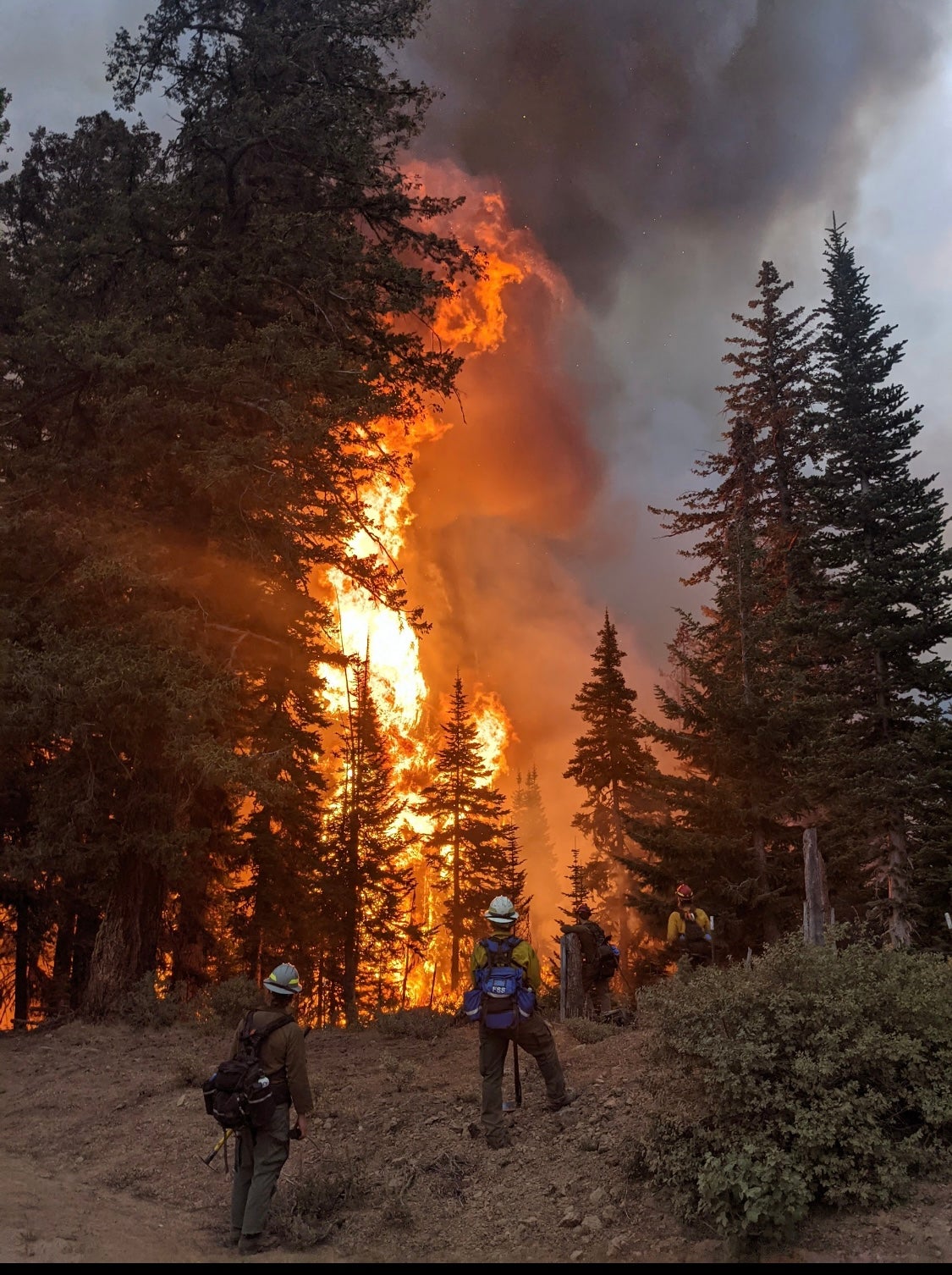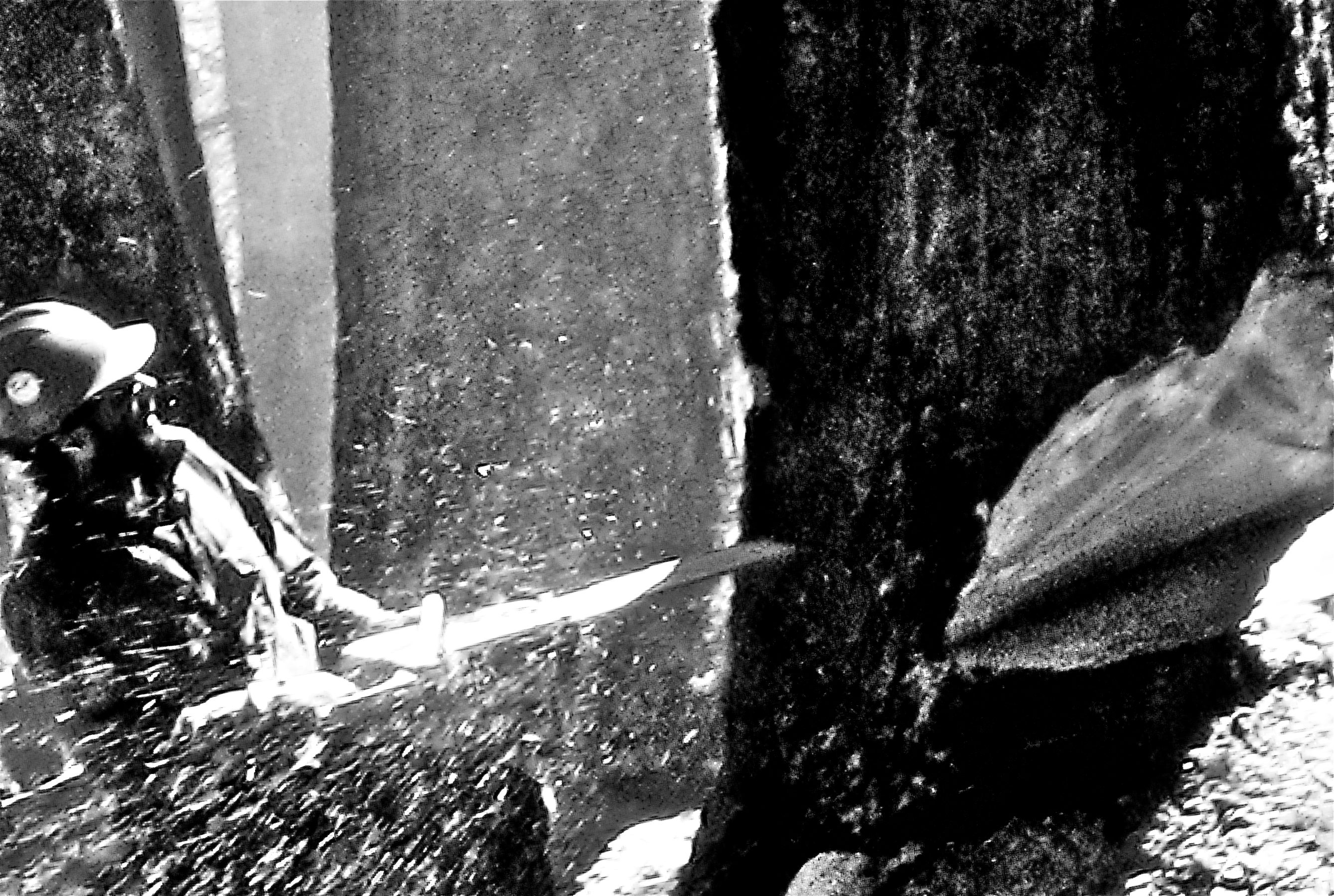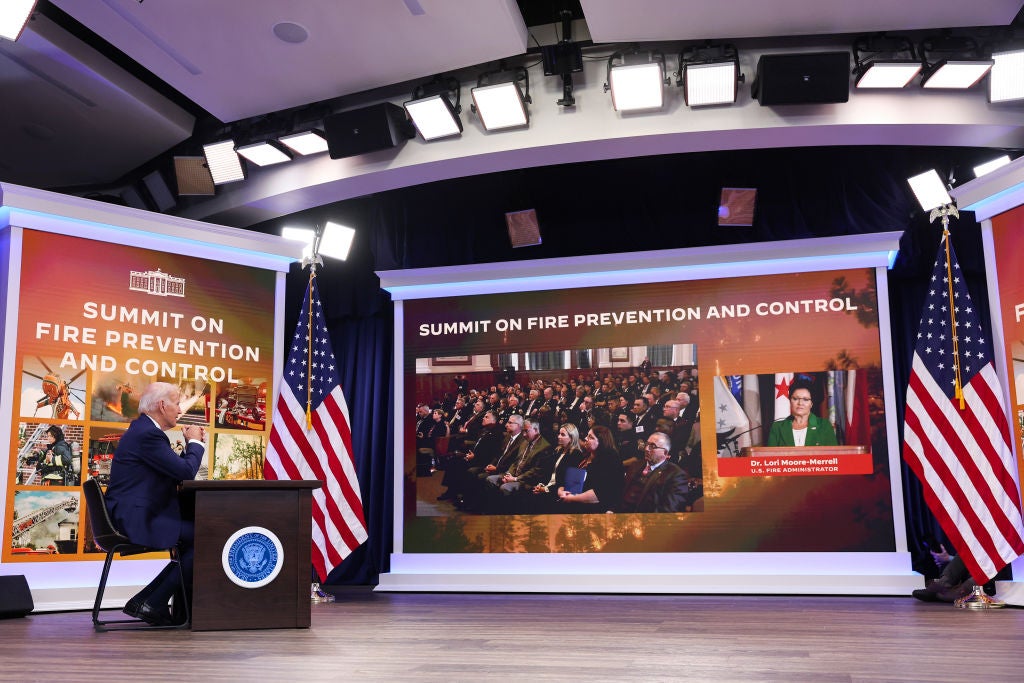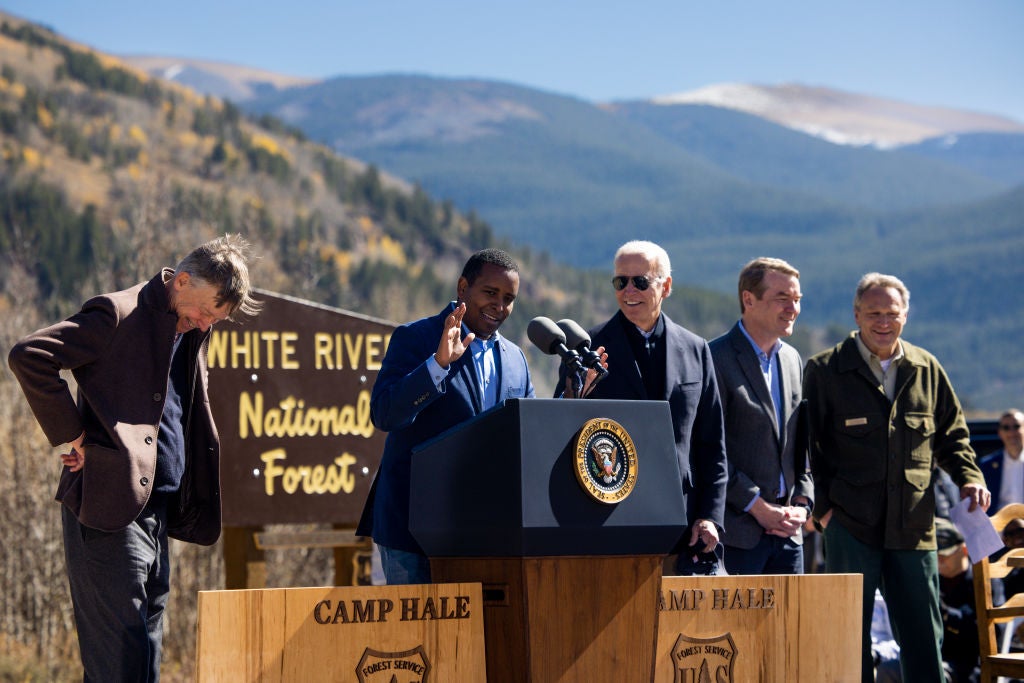Federal firefighters make less than fast-food workers. Congress is stalling on a solution
Legislation to permanently raise firefighter pay and improve working conditions has stalled in the House and Senate. The federal workforce in a state of crisis as another summer of extreme wildfire risk approaches
For $13 an hour, you can work in fast food. Or, you could engage in close-quarter combat with the country’s most catastrophic wildfires.
This was the starting salary for federal wildland firefighters until two years ago, when the Biden administration allocated $600m from the Bipartisan Infrastructure Law to increase entry pay to $15 p/h. The funding was intended to be a “bridge” while lawmakers worked on long-term reform, President Biden said at the time.
Yet a permanent fix remains elusive with Congress more bitterly divided than ever, and the House limping along in even basic tasks like funding the government.
Wildland firefighting is a rare issue which draws wide bipartisan support, and lawmakers have been able to agree on temporary pay extensions. But the latest one, passed last month, is set to expire at the end of the fiscal year in September, meaning that without a bill being passed soon to create a permanent fix, pay could drop right in middle of the traditional fire season — leaving firefighters in the lurch.
“If we can’t get something done this year, then I don’t feel so good that we’ll get anything,” said Riva Duncan, a former firefighter and vice president of Grassroots Wildland Firefighters.
The National Federation of Federal Employees, a labor union representing thousands of firefighters, pointed out the chaos that the continued uncertainty had already caused.
“For months, these selfless men and women have had to live with the possibility of their pay being cut in half overnight,” said NFFE president Randy Erwin.
Government agencies are working towards improve mental health services — suicide, depression, anxiety disorder, alcohol issues and PTSD rates are higher among firefighters than the general population — and better job classifications. But legislation that would provide long-term stability for the workforce has languished in both chambers.
‘The gold standard’
Some 19,000 firefighters work for the US government, protecting more than a million square miles of land. Unlike municipal or state employees, they deploy to fires anywhere in the country with specialized crews like those who parachute into remote fires (the smokejumpers); tackle fires’ most challenging areas (hotshots), and rappel down into blazes from hovering helicopters (helitack).
But for years many federal firefighters were classed as “forestry technicians,” and often lacked sufficient health care or housing on the job.

These issues have made recruiting adequate numbers more difficult at a time when the country faces an “ongoing wildfire crisis”, officials warned.
Last July, the Wildland Firefighter Paycheck Protection Act (WFPPA) was introduced by Arizona’s Independent Senator Kyrsten Sinema to create permanent salary increases; “premium pay” for those fighting fires that last longer than 36 hours; and cover additional rest and recuperation.
In the House, Colorado Democrat Joe Neguse also introduced Tim’s Act, a bill described as the “gold standard” by wildland firefighters. It would raise starting wages to at least $20 p/h; provide health care to both temporary and permanent wildland firefighters; and create a national database to track chronic disease caused by on-the-job exposure. The bill also contains provisions for in-depth mental health support for firefighters and their families, and housing stipends for those on duty more than 50 miles from home.
The legislation was named after Tim Hart, a smokejumper from Wyoming who was killed during the Eicks Fire in New Mexico in 2021.
“In Tim’s honor, his widow – Michelle Hart – courageously turned her grief into action and began advocating on behalf of her husband and other wildland firefighters,” Rep. Neguse told The Independent in an email.

“The brave men and women in this workforce are subjected to grueling circumstances, from the physical and emotional toll to the lack of adequate housing and pay. Ultimately, they deserve to be compensated for the work they undertake on behalf of millions of Americans. It is the right thing to do.”
However, the bill appears to be a non-starter. “There are certain legislators who think Tim’s Act is too big, and what that usually means is that it’s too costly,” said Duncan from Grassroots Wildland Firefighters. The current and former firefighters who spoke to The Independent for this article belong to the nonprofit which advocates for better conditions in the profession.
This story is part of ‘Global Warning’, a new series from The Independent, telling the stories of people on the front lines of the climate crisis across the US
Jonathon Golden, a former firefighter and Grassroots’ legislative expert in Washington DC, agreed that Tim’s Act was likely “too ambitious” for Congress. He added that Senator Sinema’s Pay Protection Act, with its narrower set of provisions, stands a better chance.
The Senate bill passed the Homeland Security and Governmental Affairs Committee on a 10-1 vote with only Kentucky Republican Rand Paul in opposition. The bill now needs to pass the House, an effort also being led by Rep. Neguse.
“While I wish that the Wildland Firefighter Paycheck Protection Act would further support our firefighters, this bill is an important step in the right direction,” he said.
He noted that funding to extend pay in last month’s spending package “opens the door for Congress to continue our bipartisan pursuit of a permanent fix for firefighter pay”.

In a statement, Senator Sinema also told The Independent that she would “continue fighting for a permanent fix”.
For now, firefighters remain cautiously optimistic. However, if Congress doesn’t pass legislation this year, the chance of meaningful change for wildland firefighters looked more remote, said Duncan, who retired in 2020 after 30 years with the US Forest Service.
“We try hard to be non-partisan at Grassroots because we’re trying to get everybody’s support,” she told The Independent. “But typically Republicans don’t like to spend more money, so if a Republican gets into the White House again, then I personally feel like we’re done for the next four years.
‘A gut-wrenching decision’
The workforce is losing firefighters with decades of experience from key middle management roles - the “glue” that holds everything together, as former wildland firefighter Luke Mayfield told The Independent.
Last June, US forest service deputy chief Jaelith Hall-Rivera estimated that 30-50 per cent of the firefighting workforce “would leave the service and go elsewhere”. The firefighters’ union has warned that members will leave their jobs in “droves” unless increased pay and improved benefits are secured.
Some leave for the private sector but others have transferred to state and local crews, where pay can be double a federal job.
“People who are leaving for financial reasons are doing it under duress… it is a gut-wrenching decision for them,” Duncan said. “This is a group of people who truly love what they do. It’s not just a job, it becomes so much a part of your life. It is a brotherhood, a sisterhood.”
The climate crisis is also shifting the equation in an already dangerous job. Fire season now lasts year-round with more large blazes that behave in unpredictable ways. In February, Texas had its largest wildfire in state history and 10 new large fires were reported last week across the US.
For those employed to fight fire, this means longer periods of time away from family and friends doing grueling work in conditions that take both a physical and mental toll.

A growing body of research has revealed the devastating impact of these conditions. Dr Patricia O’Brien, a psychologist and former hotshot, found significantly higher rates of probable depression, anxiety disorder and PTSD among firefighters than the rest of the population. Suicidal ideation, binge drinking, and smokeless tobacco use occur at 2-10 times the rates of the general public, and divorce rates are higher. In 2015, more firefighters died by suicide than in the line of duty.
Sinema’s office said that permanent pay rises for firefighters could be included in future National Defense Authorization Act legislation, that specifies what the US military spends its money on, and where members typically fit priorities that wouldn’t otherwise pass.
Duncan noted that, unfortunately, when large fires break out, it tended to help their cause.
“It reminds people that it’s always fire season somewhere,” she said, highlighting the recent Texas blazes. “We’re seeing devastating losses out there. Maybe not a lot of houses, as we see in California, but livelihoods of ranchers, and thousands of livestock.”
Golden said that to get legislation onto a lawmaker’s radar, he tried to meet them where they’re at: If the climate crisis was unlikely to play with a conservative member, for example, then perhaps they might be concerned about national security.

He pointed to the Department of Defense’s climate strategy, which mentions the threat of wildfires, and that theTexas fires had briefly forced a nuclear weapons facility north of Amarillo to evacuate.
“I’m trying to pull all the levers that I can think of to raise awareness,” Golden told The Independent.
But there is a very real risk that masses of federal firefighters will not wait around long enough for Congress to act.
Last year, a bipartisan group of Senators urged Senate Leaders Chuck Schumer and Mitch McConnell to avoid mass resignations within the ranks by ensuring prompt passage of the Wildland Firefighter Paycheck Protection Act.
The Independent has asked Senate and House majority and minority leadership for comment on what actions they are taking to help pass the legislation. None had responded to emails seeking comment at the time of publication.
“I think a lot of our younger folks find it really frustrating because why wouldn’t people support us in this?” Duncan said.
“Whether it’s a fire in your backyard, you’re breathing in smoke from Canada, or beef prices go up because we lose a bunch of cattle, everyone is going to be affected. So everyone should really be interested in this.”
If you or someone you know is struggling or in crisis, help is available. Call or text 988 or chat at 988lifeline.org.
If you are based in the UK and are struggling to cope, you can speak to the Samaritans, in confidence, on 116 123 (UK and ROI), email jo@samaritans.org, or visit the Samaritans website to find details of your nearest branch.
If you are in another country, you can go to www.befrienders.org to find a helpline near you
Join our commenting forum
Join thought-provoking conversations, follow other Independent readers and see their replies
Comments
Bookmark popover
Removed from bookmarks